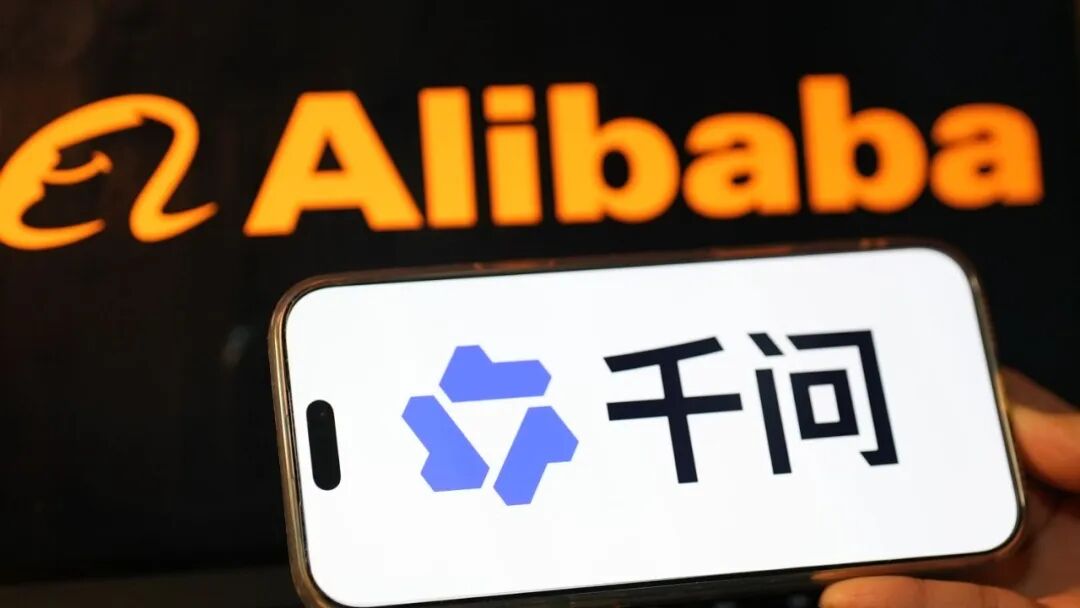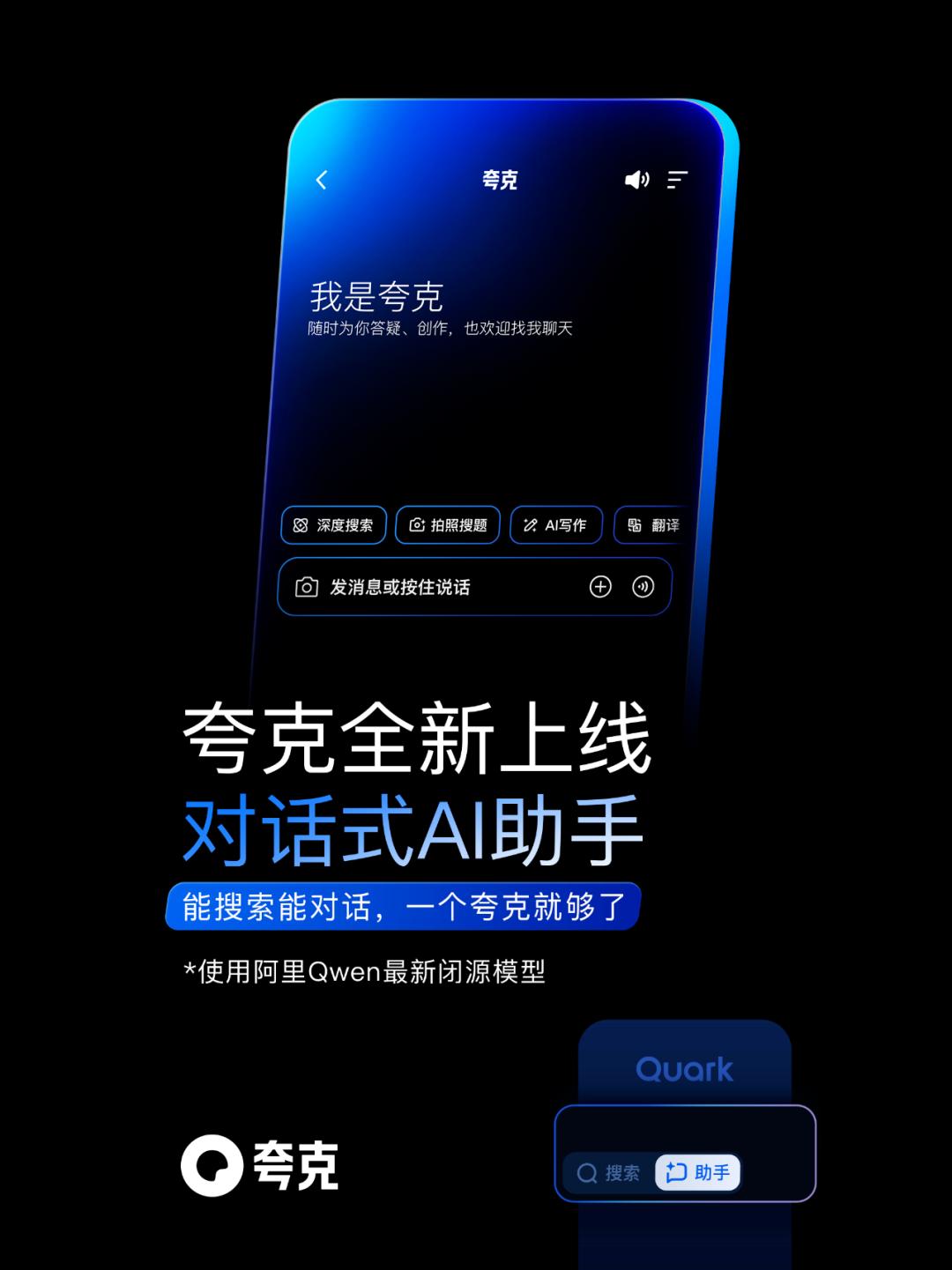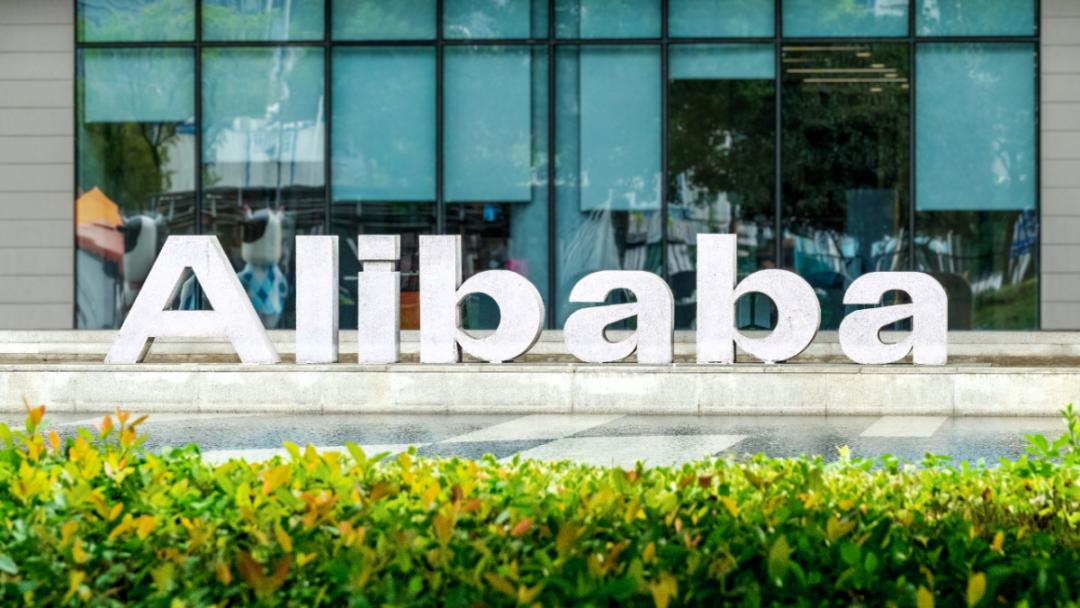Qianwen Can't Afford to Fail, Is Kuake 'Helpless'?
![]() 11/23 2025
11/23 2025
![]() 500
500

By Guo Jiayi
Edited by Zhang Xiao
The competition among major companies for the AI super entry point is intensifying.
On November 17th, Alibaba announced the public beta launch of the 'Qianwen' App, a revamped version of the former 'Tongyi' App, becoming another 'X' factor.
It's not that 'Qianwen' presents greater disruptiveness in terms of technology, capabilities, or form—
It is not a new species but rather a replica of the 'Tongyi Qianwen' and 'Tongyi' Apps. Alibaba released 'Tongyi Qianwen' in late October 2023, around the same time as Baidu's Wenxin Yiyan and ByteDance's Doubao. Last May, 'Tongyi Qianwen' was renamed 'Tongyi'.
This AI-native application has been released for two years, undergone two renamings, and has not performed ideally in terms of user scale. QuestMobile data shows that among the top three AI applications in China by monthly active users in September this year, Doubao, DeepSeek, and Tencent Yuanbao ranked first, second, and third, with MAUs of 172 million, 145 million, and 32.86 million, respectively. Tongyi lagged significantly, ranking only tenth with 3.06 million monthly active users.
The core variable lies in the changes in Alibaba's narrative and strategic approach around C-end AI entry points.
Before the revamp and renaming of 'Qianwen', the strategic role of Kuake as an entry point had been repeatedly emphasized in Alibaba's 'AI to C' narrative.
In March this year, Kuake was upgraded to an 'AI Super Frame' and explicitly designated as an AI flagship application by Alibaba. A month ago, Kuake launched an AI conversation assistant, adding an AI assistant frame to its existing search box. At the time, many external voices claimed that Kuake aimed to become China's ChatGPT.

Photo/Kuake Official Weibo
Earlier, after Tongyi Qianwen and Kuake were both placed under the 'AI to C' segment late last year, for nearly a year, Alibaba's focus leaned more towards Kuake than Tongyi Qianwen. A report by Caixin in June this year mentioned that several Alibaba insiders noted that the application team for Tongyi Qianwen was not composed of the company's main developers, and at the time, the primary traffic support for 'AI to C' applications was directed towards Kuake.
Now, with the renamed 'Qianwen' being pushed back to the forefront, it to some extent represents a change in Alibaba's thinking about C-end entry points in the AI era, as well as changes in its layout and strategic approach.
This has brought about higher uncertainty in the competitive landscape. The failure of the 'Tongyi Qianwen' and 'Tongyi' Apps does not mean that 'Qianwen' will not succeed, especially since Alibaba had largely 'not exerted itself' in AI-native applications, as its focus was on Kuake.
This has also brought new doubts and pressures to Alibaba. With Alibaba determined to make Qianwen the core AI super entry point, how will Kuake be repositioned? Can Qianwen achieve a latecomer advantage?
01
The Limitations of Kuake and the Necessity of Qianwen
The competition among internet giants for C-end AI entry points essentially revolves around two 'frames':
One is the search frame, and the other is the Chat frame.
These represent two strategic paths for C-end AI applications—the former involves the transformation, upgrading, and even reconstruction of old applications by AI, with broader potential adaptation scenarios, while the latter is a competition among AI-native applications, with the most typical example being Chat assistants.
At this stage, the boundaries between the search frame and the Chat frame are increasingly blurring.
In March, when Kuake underwent a comprehensive upgrade and launched the 'AI Super Frame,' a core concept was to achieve 'ALL in One.' At the time, Wu Jia, Vice President of Alibaba Group and CEO of Kuake, mentioned that the new Kuake completely abandoned the concept of the traditional search frame, and the 'AI Super Frame' would be infinitely close to a personal super all-around assistant.
Last month, when Kuake launched its conversational AI assistant, it also emphasized its 'ALL in One' capability, with the official promotional language stating, 'It can search and converse—one Kuake is enough.'
To some extent, this represents Alibaba's previous strategic approach:
Although it had early on launched the 'Tongyi Qianwen' or 'Tongyi' App, in the face of competitors like ByteDance's Doubao and Tencent's Hunyuan, Kuake seemed sufficient, and there was no need for another AI-native application as an entry point.
In March, Wu Jia optimistically predicted that a super AI application with a DAU exceeding 100 million would emerge in the first half of 2025 or 2026, saying, 'We aim to be the first.'
But now, Alibaba's approach has clearly changed.
A few days ago, when interviewed by LatePost, the Qianwen team mentioned that in the first half of the year, Alibaba did hope to use Kuake as an entry point for the AI era because Kuake had an existing user and product base and was a product popular among young people. However, with the advancement of AI capabilities, the team felt that a conversational AI assistant would be a better form.
Ultimately, it was Wu Yongming who made the judgment and decision—Alibaba must have an AI-native C-end super entry point.

Soon after, you can see that Alibaba is now describing Qianwen in the same way it previously described Kuake—now it's 'Qianwen aiming to be China's ChatGPT,' and the subject of 'ALL in One' has shifted to Qianwen.
Of course, you can't say that Alibaba has wavered in its pursuit of C-end consumer entry points. As one of the companies most adept at embracing change in China and even globally, there's little room for discussion about Alibaba's 'change.' The more critical questions are why Alibaba changed and how it changed.
Further dissection reveals what values in Alibaba's AI layout can be achieved by Qianwen but not by Kuake?
The answer lies in the completeness of the AI narrative and the AI ecosystem closed loop (closed loop).
Looking back, Alibaba did not neglect AI-native applications from the beginning. Just from a timing perspective, the launch of Tongyi Qianwen two years ago was relatively prompt.
However, firstly, Alibaba's AI ecosystem development path over the past two years has leaned more towards focusing on AI infrastructure construction and AI to B;
Secondly, during the previous application integration trend sparked by DeepSeek, Alibaba did not follow up immediately, objectively missing the peak traffic period. Of course, this was also related to Alibaba's preference for integrating self-developed reasoning models into C-end applications.
Objectively, these factors contributed to the widening gap between the Tongyi Qianwen App and Tongyi App compared to Doubao, Hunyuan, and others.
Now, let's look at Kuake. It is not a strictly AI-native application, but it has a user base, rich AI capability implementation scenarios, and has indeed shown remarkable growth. After transitioning to intelligent search in 2018, Kuake's user base exceeded 100 million within three to four years, with annual user growth rates exceeding 200% from 2020 to 2023.
This means that for at least the past two years, Alibaba has been largely absent in AI-native applications because the 'Tongyi Qianwen' and 'Tongyi' Apps underperformed. However, when focusing on AI capability implementation, Kuake objectively filled the gap for Alibaba.
However, the competition in AI to C is clearly not just about product competition; the entry point competition is essentially an ecosystem competition. At this stage, the limitations of Kuake will gradually become apparent.
At the product level, Kuake has indeed achieved functional coverage of both the 'search frame' and the 'Chat frame,' but from a user perspective, search remains its primary attribute. It is large and comprehensive, but it is difficult to unify user perception.
At the ecosystem level, under the long-term positioning of an AI super entry point, the strategic significance of an AI entry point lies in its potential core 'fulcrum' role in the future. The Qianwen project team is currently collaborating with teams from products such as Taobao, Gaode, Shangu, and Alipay to develop deeper integration with relevant products and solve practical user problems. Kuake clearly cannot serve as this fulcrum.
02
How to Reposition Kuake?
Alibaba's repositioning of Qianwen has also brought a new dilemma:
After anchoring Qianwen as the core force in the 'future battle of the AI era,' how should Kuake be repositioned?
It will, of course, remain Alibaba's flagship C-end product and become more focused. Alibaba has clearly defined Kuake's positioning as AI search and AI browser.
The Qianwen team also mentioned that a Chatbot like Qianwen and Kuake's Super Frame are not entirely contradictory, 'For example, just because Google developed Gemini doesn't mean Google Search becomes unimportant.'
However, this also means that Kuake needs to return to its familiar 'tool attribute.' It will be difficult for it to remain 'ALL in One' and instead must focus on what it should and can do.
In the update on November 18th, Kuake launched the Qianwen Assistant, claiming to use Alibaba's most powerful Qwen model, 'with a more advanced model and smarter responses.' This is almost identical to the launch of Kuake's AI conversation assistant last month, with the only significant difference being the stronger emphasis on the AI conversation entry point being 'Qianwen.'""In other words, under Alibaba's current C-end AI narrative, Kuake remains important, but in terms of strategic priority, it must yield to Qianwen.
Over the past two years, Tongyi App and Kuake have faced a similar situation, except that Alibaba temporarily shifted its focus to Kuake. Before becoming 'Qianwen,' Tongyi had not even utilized Alibaba's most powerful large model.
From another perspective, a cursory look at the potential direction of Alibaba's AI ecosystem actually resembles that of OpenAI, at least superficially.

Photo/China Post Securities
OpenAI introduced a search function last year and launched the AI browser ChatGPT Atlas on October 22nd. The next day, Kuake launched Chat.
OpenAI announced in September this year the launch of a shopping feature called 'Instant Checkout' for ChatGPT, enabling a closed loop from 'people finding goods' to 'goods finding people' and from 'recommendation' to 'transaction.' Shopping platforms that have collaborated with ChatGPT include Etsy, Shopify, and Walmart. Alibaba is now also diligently planning similar features.
There's also social networking. OpenAI released the social application Sora in September this year, transitioning from an AI tool to an AI social application.
It's not hard to see that from search to social networking to e-commerce, OpenAI has covered most of the high-traffic scenarios in the internet ecosystem, except for content.
This corresponds to OpenAI's platformization path.
'OpenAI is no longer a product-focused company but aims to become the 'Windows of the AI era,' transitioning into a platform company. By binding key links in the semiconductor industry chain, OpenAI attempts to construct an operating system-level monopoly similar to Windows—connecting computing power and applications through models. ChatGPT serves as the 'desktop' of the new operating system; the plugin ecosystem is the new generation 'application layer'; Sora, multimodal generation, and reasoning capabilities are the 'interfaces' of the operating system; while the underlying supercomputing power, chip collaborations, and Azure cloud architecture form the hardware and infrastructure layer,' said China Post Securities in a research report.
Its sole platformization entry point is undoubtedly ChatGPT.
Using this as a reference, the super entry point for Alibaba's AI must also possess uniqueness. Now, Alibaba hopes that Qianwen will become this entry point, rather than Kuake.
Furthermore, although Alibaba and OpenAI's strategic directions are generally aligned, their paths are reversed—OpenAI first grew the most popular AI-native application on the planet, with a market share of 74.7% in September this year (data from Firstpapesage), while Alibaba's initial response to the AI boom was to focus on infrastructure before diving into applications.
Retrospectively, the strategic upgrade of Kuake over the past two years seems more like an 'accident':""It encountered Alibaba's yet-to-be-formed AI ecosystem strategy at an inopportune time. Now that Alibaba has clarified its approach, it's not surprising that Kuake yields to Qianwen.
Of course, if 'Tongyi Qianwen' or 'Tongyi' had performed better, Kuake wouldn't have first gained favor and then lost it.
03
Resources Committed, 'Bold Words' Spoken, Qianwen Can't Afford to Fail Either
To this day, when determined to engage in a battle, Alibaba remains one of the most powerful, agile, and fastest-executing major companies.
According to LatePost, after Wu Yongming declared that 'Alibaba must have an AI-native C-end super entry point,' in September, Alibaba transferred hundreds of engineers from Beijing and Guangdong to the C4 building in Alibaba's Xixi Park to work on the Qianwen project in a closed development environment. The team primarily consisted of the Smart Information Business Group, with participation from Alibaba Cloud, Tongyi Laboratory, Taobao, Gaode, and other businesses.
You can also easily see the current level of importance Alibaba places on Qianwen—
For example, Qianwen is Alibaba's another group strategic project this year, following its 380 billion AI infrastructure investment and Taobao Shangu. The statement made by Wu Yongming on the company's intranet in May is still in effect, where he mentioned, '...we will adopt a saturated investment approach, focusing on several core battles. These key battles will involve multiple business units, leveraging their respective strengths and advantages...'
For example, Qianwen is not even benchmarking against Doubao or DeepSeek but rather ChatGPT.
Alibaba does not believe that it is too late to reinvest resources in developing Qianwen as a super entry point.
The Qianwen team believes that, firstly, no AI application in China has yet stably surpassed 100 million DAU, an important threshold indicating the emergence of a national-level AI application; secondly, regardless of which domestic product, objectively speaking, they are still in their early stages and have not truly evolved to solve many practical problems.
In summary, Alibaba has pushed Qianwen to the forefront, achieving unity in determination, ambition, and confidence.
However, Alibaba's challenges are clearly not small.
As mentioned above, Qianwen is already significantly behind in terms of user scale.
Objectively, it is not overly difficult for Alibaba to quickly install Qianwen on the smart devices (such as smartphones and tablets) of more and more users. Large-scale promotional efforts can yield immediate results, and Alibaba is already doing so. Now, when you open the app store on any smartphone model, you may see prominent advertisements for Qianwen.
But Alibaba has its anxieties.

Photo/Alibaba Official Website
Compared to ByteDance, Tencent, and even Baidu, Alibaba's traffic shortcoming (weakness) is increasingly evident—ByteDance has Douyin, Tencent has WeChat, and Baidu has the Baidu App, corresponding to the three primary traffic entry points in the development of the internet: content, social networking, and search.
ByteDance's Doubao rapidly gaining traction and Tencent Yuanbao's current strategy are also backed by their own content and social ecosystems.
The sudden rise of DeepSeek follows a different logic. It does not possess the aforementioned traffic advantages but has become a global focus in an extremely short period through technological innovation combined with engineering capability innovation. This is its greatest endorsement.
Therefore, for Qianwen to quickly break through in the current situation, it can only follow its own path.
Judging from Alibaba's current ecological path, Qianwen's operational logic essentially presupposes it as a 'super entrance,' although this seems more like a passive choice.
The Qianwen team mentioned to the media, 'We must admit that the Chinese internet is actually closed, with everyone treating their own assets as the strongest competitive threshold. This is a common issue for every major internet company.' This is also why Qianwen is now eager to strengthen cooperation and collaboration depth with various internal businesses.
Objectively speaking, in terms of shopping, payment, office work, travel, and search within Alibaba's ecosystem, Qianwen is least lacking in implementation scenarios. However, most of these implementation scenarios lean more towards tool attributes, with users exhibiting a more pronounced tendency to 'use and leave immediately.'
All these factors determine that it will not be easy for Qianwen to break through again.







